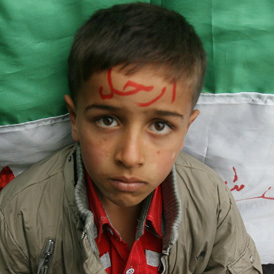Syrian refugees speak of ‘perilous’ journey
As thousands of Syrians flee the deadly violence tearing apart their country, a Save the Children’s worker writes for Channel 4 News from the border of Lebanon and Syria.

For the past month, on still nights, the Syrian refugees in the Lebanese district of Wadi Khaled have drifted to sleep to the sound of distant explosions. As the conflict in Syria rolls ever closer to the border, booming and crackling its way through villages and towns, it has forced tens of thousands of people to flee their homes.
Some have made it to Lebanon. There are almost 500 Syrian refugee families living in Wadi Khaled. Many of them arrived before the recent shelling of Homs, cutting their losses before the situation spiralled out of control and they could not escape.
Those who have arrived speak of a perilous journey, of braving freezing temperatures and ongoing conflict to reach the border. Some families report being shot at along the way, while others have lost their relatives in the chaos and spend their days in the limbo of dread, not wanting to fear the worst, not daring to hope for the best.
Channel 4 News exclusive: The horror of Homs

For children it is particularly hard. They arrive, hungry, cold and terrified, in a strange country where they don’t know anyone. Their parents are deeply stressed, and they may have nowhere to go. Some have been through unimaginably traumatic experiences. When they arrive they need help.
Save the Children is there to provide that help. On arrival, new children are invited to play areas, where specialists monitor them for signs of distress. They are encouraged to make friends, to draw, to take part in group activities and to learn about Lebanon. For many, it is the first time they have had fun in months.
Most bounce back quickly, and are enrolled in local schools. The aim is to build a routine and make a deeply abnormal situation as normal as possible. Some children are more deeply affected – so Save the Children arranges for them to receive more specialist attention.
Those who have made it to Lebanon are the lucky ones. There are tens of thousands more who are still in Syria, in desperate need of help. We’re prepared to deliver aid to anyone who needs it if we are granted access. That’s why last week we launched our campaign for full, unfettered access for humanitarian groups to deliver aid in Syria.
We know that children in Syria are in urgent need of assistance. By signing our petition, you can help us do all that we can to reach them.
The Save the Children worker who wrote this blog is remaining anonymous for security reasons.